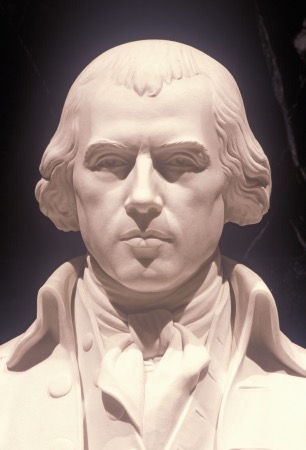The need for strong protection of intellectual property rights is greater now than it was at the dawn of our republic. Our Forefathers and the Framers of the U.S. Constitution recognized the need to secure those rights in Article 1, Section 8, Clause 8. James Madison provides insight for its significance in the Federalist Papers No. 43 (the only reference to the clause). It is contained in the first Article section dedicated to the enumerated powers of Congress. The clause recognizes the need for: uniformity of the protection of IP rights, securing those rights for the individual rather than the state; and, incentivizing innovation and creative aspirations.
Underlying this particular enumerated power of Congress is the same struggle that the Framers grappled with throughout the document for the new republic: how to promote a unified republic while protecting individual liberty. The fear of tyranny and protection of the “natural law” individual liberty is a driving theme for the Constitution and throughout the Federalist Papers. For example, in Federalist No. 10, James Madison articulated the important recognition of the “faction” impact on a democracy and a republic. In Federalist No. 51, Madison emphasized the importance of the separation of powers among the three branches of the republic. And in Federalist No. 78, Alexander Hamilton, provided his most significant essay, which described the judiciary as the weakest branch of government and sought the protection of its independence providing the underpinnings for judicial review as recognized thereafter in Marbury v. Madison.
All of these related themes are relevant to the Patent and Copyright Clause and at the center of the intellectual property protections then and now. The Federalist Papers No. 10 recognition that a faction may influence the law has been playing itself out in the halls of congress in the period of time leading up to the AIA and in connection with the current patent law reform debate. The large tech companies of the past, new tech, new patent-based financial business model entities, and pharma factions have been the drivers, proponents and opponents of certain of these efforts. To be sure, some change is inevitable, and both beneficial and necessary in an environment of rapidly changing technology where the law needs to evolve or conform to new realities. However, changes not premised upon the founding principles of the Constitution and the Patent and Copyright Clause (i.e., uniformity, secured rights for the individual, incentivizing innovation and protecting individual liberty) run afoul of the intended purpose of the constitutional guarantee.
Although the Sovereign does not benefit directly from the fruits of the innovator, enacting laws that empower the King, and enables the King to remain so, has the same effect as deprivation and diminishment of the individual’s rights and effectively confiscates them from him/her. Specifically, with respect to intellectual property rights, effecting change to the laws that do not adhere to these underlying principles, in favor of the faction that lobbies the most and the best in the quid pro quo of political gain to the governing body threatens to undermine the individual’s intellectual property rights and hinder the greatest economic driver and source of prosperity in the country.
It is also important to recognize that the social, political and economic impact of strong protections for intellectual property cannot be overstated. In the social context, the incentive for disclosure and innovation is critical. Solutions for sustainability and climate change (whether natural, man-made or mutually/marginally intertwined) rely upon this premise. Likewise, as we are on the precipice of the ultimate convergence in technologies from the hi-tech digital world and life sciences space, capturing the ability to cure many diseases and fatal illnesses and providing the true promise of extended longevity in good health and well-being, that is meaningful, productive, and purposeful; this incentive must be preserved.
In similar fashion, advancements in technologies related to the global economy and communications will enhance the possibilities for solutions to political and cultural conflicts that arise around the globe. Likewise, the United States economy has always benefited when it is at the forefront of innovation and achieves prosperity from its leadership role in technological advancements.
Conclusion
In June 1966, Senator Robert F. Kennedy addressed students at Day of Affirmation ceremonies at the University of Capetown, South Africa. In his speech Senator Kennedy said: “There is a Chinese curse which says ‘May he live in interesting times.’ Like it or not we live in interesting times. They are times of danger and uncertainty; but they are also more open to the creative energy of men than any other time in history.
It is beyond question that starting with the last decade of the twentieth century and throughout the first two decades of the twenty-first century, when it comes to matters relating to intellectual property, we have been living in “interesting times.” Some may interpret these interesting times as defined by the curse and others may view it by the ordinary meaning of “interesting.” In either case, those of us that toil in the fields of patents, copyrights, trademarks, trade secrets, and privacy rights have experienced an unprecedented sea change in the way those rights are procured, protected and enforced. Likewise, and perhaps more importantly, even those of us that do not practice in these areas of law, as well as the general public, have been, and continue to be, impacted by the consequences of these changes (both positive and negative).
How we move forward today, to solve the many problems facing our country and the broader global community in these “interesting times,” both within and without the laws affecting intellectual property rights, depends upon the “creative energy of man” which must prevail. An achievable goal, dependent on the strong, stable and sound protection of intellectual property rights.
Thus, here is my plea to the both chambers of the United States Congress, the prospective candidates for the Presidency in the 2016 election cycle, and the members of the federal bench from the District and Circuit Courts to the Supreme Court, whether you are a Member or staffer of a Member that is proposing or voting on intellectual-property-related legislation, the occupant of the Oval Office rendering pronouncements to the people from the bully-pulpit of 1600 Pennsylvania Avenue, and/or promulgating executive branch agency directives, or you are the apolitical honorable jurist or his/her judicial law clerk rendering decisions in cases between competitors, individuals or any other party to intellectual property disputed matters, abide this: Begin with, and find your guidance in, the fundamental principle behind the Framers of the constitutional provision, Article I, Section 8, Clause 8, by asking the basic question whether the result or consequence of your enterprise will “promote the progress of the sciences and useful arts” and, if so, whether it is directed to the purpose of maintaining the incentive to innovate, will achieve uniformity in its application and implementation and will remain in fidelity with securing for the individual intellectual property rights unencumbered by factious governance or desire by the Sovereign for benefits of reservation of power and tribute to the Sovereign, which was unequivocally declared by James Madison, in Federalist Papers Number 43, as the self-evident purpose of the Patent and Copyright Clause.
__________
EDITORIAL NOTE: The previous article is a shorter version of an article originally published in The Federal Lawyer. To read the full article CLICK HERE.

![[IPWatchdog Logo]](https://ipwatchdog.com/wp-content/themes/IPWatchdog%20-%202023/assets/images/temp/logo-small@2x.png)


![[Advertisement]](https://ipwatchdog.com/wp-content/uploads/2024/04/Artificial-Intelligence-2024-REPLAY-sidebar-700x500-corrected.jpg)
![[Advertisement]](https://ipwatchdog.com/wp-content/uploads/2024/04/UnitedLex-May-2-2024-sidebar-700x500-1.jpg)
![[Advertisement]](https://ipwatchdog.com/wp-content/uploads/2024/04/Patent-Litigation-Masters-2024-sidebar-700x500-1.jpg)

![[Advertisement]](https://ipwatchdog.com/wp-content/uploads/2021/12/WEBINAR-336-x-280-px.png)
![[Advertisement]](https://ipwatchdog.com/wp-content/uploads/2021/12/2021-Patent-Practice-on-Demand-recorded-Feb-2021-336-x-280.jpg)
![[Advertisement]](https://ipwatchdog.com/wp-content/uploads/2021/12/Ad-4-The-Invent-Patent-System™.png)






Join the Discussion
6 comments so far.
step back
July 14, 2016 05:50 pmAnon,
Not entirely clear on who specifically you want to see “crashing”.
Is it going to be patent practitioners first? Due to lack of invention in the USA?
Is it going to be the USPTO when their backlog dries out and there is no more work in the pipeline?
Is it going to be the politicians first? When the masses rise up in the streets and shout “Inventor lives matter!, Inventor lives matter!” (fat chance of that ever happening)
Or is it going to be Wall Street when they wake up to see that “expectations” indicate significant innovation headwinds in the foreseeable future?
Anon
July 14, 2016 03:51 pmGene and step back,
Agreed – lots of us that are upset with this area of law are like the choir. The problem of course is that those who need to be in church are the ones absent from church.
The “dig” with Citizen’s United is because certain (monied) voices are drowning out the voices of those who both know this area of law, know about the background and history of innovation, and know that multiple branches of the government (well, OK, all three branches) seem intent on crashing the car. That is also why (to play with the metaphor), I have advocated stomping on the gas of the “Gist/Abstract” nonsense of the Alice decision. I think that the faster we crash, the faster we can turn this around and recover. Attempts at “softening” – to me – will only prolong the impending disaster. A full crash NOW may be the only thing that wakens Congress and allows them to realize that the monied voices have been playing the siren’s role.
step back
July 14, 2016 01:41 pmAnon @2
Not only a captured agency …
But also a captured Supreme Court thanks to entry of extra-judicial “facts” by way of amici briefs and by way of know-it-all Justices taking Official notice in arts in which they are wholly incompetent (i.e. biotech, computers, the fundamental fundamentals of “science”).
Gene Quinn
July 14, 2016 11:29 amAnon-
The longer article does go into the AIA. It is worth reading in its entirety, albeit a little long for our format here.
I opted to publish this part of the article, which focused more on policy and history. Not because the other parts of the article weren’t good or worth reading, but because we’ve pretty well beaten the AIA horse dead here. I also didn’t want to lose the reader. This raises very important issues (in my opinion) so I wanted to make sure our audience saw those points and didn’t bypass the article believing it to be another that decried the AIA. Not that the AIA doesn’t deserve the criticism.
So, long answer, but that “miss” is mine not the authors and done to make sure the thrust of the article was the focus. I figured our audience would know about the mess that has been IP law over the past 5-10 years.
-Gene
Anon
July 14, 2016 10:51 amYou missed perhaps the most obvious one: AIA.
Can you say “captured”…? (courtesy of the “voices” of Citizen United)
step back
July 14, 2016 06:51 amMaybe we need a follow up article on the need by the rest of the world (ROTW) for a weakened American patent system and who in “our” government is obliging “them” by coming up with all sorts of “innovative” ways of decimating the American inventor?
Shall we count the ways?
1) Alice/Mayo
2) Death squad IPRs
3) Prolonged appeal times at PTAB
4) District courts granting summary judgment without claim construction based on lead given by higher court in Bilski/Alice
5) Labeling patent owners pejoratively as trolls
6) KSR v Teleflex (a more flexible way of pooh poohing based on obviousness)
7) ….
Come on you guys. Someone out there must have more to add to our growing list of “innovative” ways to undo innovation in America.